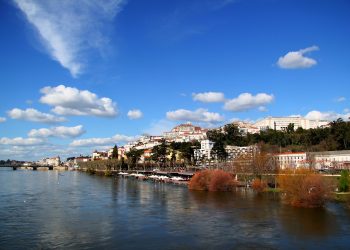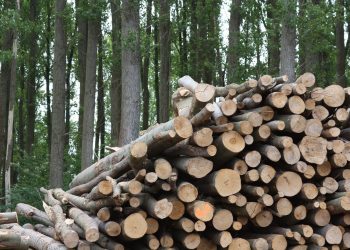In Catalonia there are 7.7 million residents and approximately 7.9 million pigs. That’s over one pig per person.
Large-scale pig farming has led to an excess of nitrogen in the soil, a problem shared by many European regions. But just a few kilometres from Barcelona, a small revolution is turning this waste into a valuable resource.
Instead of applying raw manure to fields, researchers are extracting the nitrogen from the locally produced agro-industrial waste and processing it as ammonium sulphate. This more stable and efficient fertiliser minimises harmful runoff.
Chemical reduction
The researchers are part of a four-year EU-funded initiative called Waste4Soil. They are exploring innovative ways to convert food processing waste into locally produced soil improvers, addressing two major EU challenges at once: food waste and soil health.
In Catalonia, the researchers are using a process called anaerobic digestion, in which bacteria break down waste into biogas and a nutrient-rich wet mixture called digestate.
“It is a very consolidated technology, there are more than 15 000 agro-industrial biogas plants around the EU,” said Dr Victor Riau, a researcher at the Catalan Institute of Agrifood Research and Technology
“Every year, 1 billion tonnes of food is wasted globally, with 38% coming from food industry residues.
By recycling the food waste residue in this way, the researchers believe they could reduce reliance on chemical fertilisers by up to 80%.
Working together with private and public companies dealing with food means that the results of the research will immediately benefit the local community.
“We expect that this circular approach will have a positive effect on the economy of the local industries, reducing waste management costs and increasing the use of cheaper renewable resources,” said Riau.
Less waste, more nutrition
The Waste4Soil research team has set up Living Labs – real-life test environments – in seven European countries: Spain, Finland, Greece, Hungary, Italy, Poland and Slovenia.
The aim is to test out a range of innovative solutions for transforming waste from different agrifood sources into local, bio-based soil enhancers.
In addition to pig farms, other local food industries are being targeted, including olive oil and beer production, as both generate massive amounts of biological waste.
“Every year, 1 billion tonnes of food is wasted globally, with 38% coming from food industry residues,” said Dr Kyriakos Panopoulos from the Centre for Research and Technology Hellas in Thessaloniki, Greece, who is responsible for the overall coordination of the research effort.
Faced with this mountain of waste, the EU announced plans last year to establish legally binding targets for the reduction of food waste, to be reached by 2030.
At the same time, Panopoulos noted that 60–70% of EU soils are currently severely depleted of nutrients, giving rise to concern.
To tackle this, the Waste4Soil research team is advancing EU-wide efforts to restore the continent’s degraded soils by 2050 – an objective of the European Green Deal.
Slovenia’s liquid gold
In Slovenia, global warming is creating favourable conditions for olive groves, and a budding local olive oil producer is one of the participants in the Slovenian Living Lab.
On the northern Adriatic peninsula of Istria, renowned for its high-quality olive oil, researchers recycle olive pomace – a byproduct of olive oil production that includes skins, pits and pulp – to create soil improvers.
This helps to enrich the soil with carbon and reduce the environmental impact of having to dispose of the waste.
“Slovenia’s innovative approach could inspire other olive oil-producing regions in Europe, particularly in the Mediterranean, which face similar waste management challenges,” said Dr Rok Mihelič from the Department of Agronomy at the University of Ljubljana.
Finland’s fishy idea
Different regions of Europe face different challenges, and the researchers are exploring a variety of waste reuse and soil enrichment options. Some of them are rather off the beaten track, or even out at sea.
The Living Lab in Päijät-Häme, Finland, for example, is looking to fish farming – one of the main local food industries – for waste that can be transformed into nutrient-rich fertilisers.
Anne-Marie Tuomala, senior lecturer at LAB University of Applied Sciences in Lahti, Finland, explained that fish residues, rich in nitrogen, phosphorus and other minerals, are ideal for nutrient recovery.
“Farmers and food producers adopting these sustainable practices could gain a competitive edge.
Similarly to the waste from pig farms, these can be processed through anaerobic digestion to create a nutrient-rich residue.
However, the smelliness of fish residues has made it challenging to transport and store, according to feedback provided by farmers during the first months of the Living Lab. To address this issue, specialised facilities with odour control measures may be necessary, said Tuomala.
This circular approach could lower costs for farmers, especially with fertiliser prices soaring after the 2022 Russian invasion of Ukraine. While prices have stabilised, the EU remains heavily dependent on imports of Russian fertilisers.
Competitive edge
In addition to reducing imports, an added benefit of the fertilisers produced by the Waste4Soil Living Labs is that they are local and sustainable.
“Farmers and food producers adopting these sustainable practices could gain a competitive edge in markets increasingly prioritising eco-friendly products,” Tuomala said.
The strength of the initiative lies in collaboration. Researchers, farmers, civil society, industries and public authorities work together to co-create and test solutions in real-world conditions.
According to Panopoulos, the collaborative action will provide solutions to the ever-increasing problem of food residues that are currently wasted.
“Every small step is important, and there is growing excitement about the broader potential for creating more sustainable and environmentally beneficial agricultural practices,” he said.
Research in this article was funded by the EU’s Horizon Programme. The views of the interviewees don’t necessarily reflect those of the European Commission. If you liked this article, please consider sharing it on social media.
O artigo foi publicado originalmente em Horizon, the EU Research and Innovation Magazine.




















































